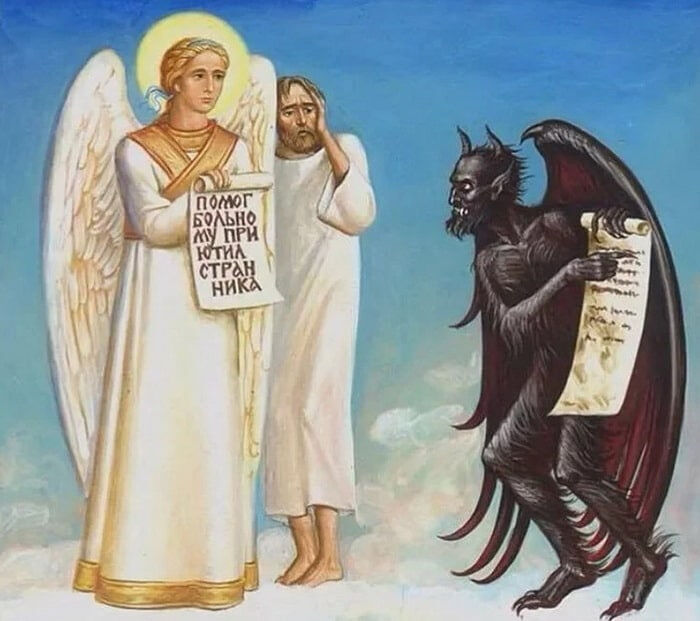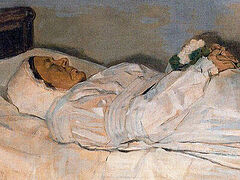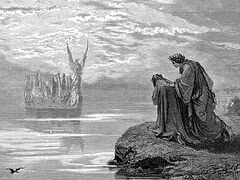Reading these and other similar testimonies, many are perplexed. How, they think, can we reconcile more acute senses of the soul with the impossibility for it to repent? The fact is that repentance is more than a mere feeling. Remorse is possible after death, as Blessed Theophylact writes in the above commentary—but it will be fruitless for those who did not repent in their lifetimes. The Venerable Ephraim the Syrian says the same: “There are tears of repentance, when the soul desires eternal good things, and they are very sweet and beneficial. And there are tears of remorse, where (according to the Savior’s word) there is weeping and gnashing of teeth (Mt.8:12), and these tears are bitter and useless, because they are altogether fruitless.”1
The fact is that repentance is not only the awareness of your sins, but also the desire and opportunity to change, to be cleansed from them, to be spiritually transformed. Transformation is possible only by the movement of the human will and the work of grace, and “the time and place for the action of grace is here alone”, as the Holy Fathers wrote.
St. John of Kronstadt said:
“A terrible truth. Impenitent sinners after their death lose every possibility of changing for good, and therefore remain unalterably given up to everlasting torments (for sin cannot but torment). <…> Who does not know how difficult it is, without God’s special grace, for a sinner to turn from the way of sin that is so dear to him into the path of virtue?... But for the grace of God, what sinner would have returned to God? For it is the nature of sin to darken our souls, to bind us hand and foot. But the time and place for the action of grace is here alone: after death there remain only the prayers of the Church, and these prayers can be efficacious for penitent sinners alone—that is, only for those who have developed in their souls the capability of receiving God’s mercy or of benefiting by the prayers of the Church—that is, the light of the good works which they have taken with them out of this life.”2
Blessed Theophylact of Ochrid wrote:
“The sinner is in darkness even in this life, as he has fallen away from the Sun of Righteousness. But as there is still hope of conversion, this is not yet the ‘outer’ darkness. But when he has died and an examination has been made of the things he has done, then the outer darkness in its turn receives him. For there is no longer any hope of conversion, but he undergoes a complete deprivation of the good things of God. While he is here in this life he enjoys to some degree the good things of God, I mean, the tangible things of creation, and he believes that he is in some manner a servant of God, living out his life in God’s house, which is this creation, being fed by Him and provided with the necessities of life. But then he will be altogether cut off from God, having no share at all in the good things of God. This is that darkness which is called ‘outer’ by comparison to the darkness here, which is not ‘outer’, because the sinner is not yet completely cut off from this time onward.”3
Reflecting on the same subject, St. Theophan the Recluse, wrote:
“Now or tomorrow death will come, and it will end all that is ours, and will in itself be imprinted on our destinies forever, for there is no repentance after death. We will stand before the Judgment seat in that state death finds us.”4
“The law of life is such that as soon as someone plants the seed of repentance here, even at his last gasp, he will not perish. This seed will grow and bear fruit—eternal salvation. And if someone does not plant the seed of repentance here and passes over with the spirit of unrepentant persistence in sins, then he will remain there forever with the same spirit and reap forever the fruit of it according to its kind—God’s eternal rejection.”5
As we can see from these words, a salvific change after death is possible only for those who, according to St. John of Kronstadt, “have developed in their souls the capability of receiving God’s mercy—the light of the good works which they have taken with them out of this life.”
All Orthodox Christians who died in repentance have hope of salvation from hell, even if they did not have time to bring the fruits of repentance sufficient for cleansing their souls and therefore did not attain Paradise: the prayers of the living can help them. Their painful state can be changed. Their “seed of repentance”, albeit small, can bring the fruit of eternal life through the prayers of the Church.
The Epistle of the Patriarchs of the Eastern Catholic Church on the Orthodox Faith (1723) reads:
“The souls of people who fell into mortal sins and did not despair at death, but once again before being separated from the real life of those who repented, only who did not manage to bear any fruits of repentance (which are: prayers, tears, contrition, consolation of the poor and expression in actions of love for God and neighbors that the entire Catholic Church from the very beginning recognizes God-pleasing and useful), the souls of such people descend into hell and suffer punishment for the sins they have committed, without depriving, however, of relief from them. They receive relief by infinite goodness through the prayers of the Priests and the beneficence performed for the dead; and especially by the power of the bloodless Sacrifice, which, in particular, the clergyman brings for each Christian about his relatives, in general, for all, the Catholic and Apostolic Church brings daily.”6
That is, it is not that the love of God turns away from the sinner after death, but the soul itself changes after death, and if there is no “light of the good works” or “seed of repentance” in it, it will not be able to receive God’s help and be transformed by repentance. The Holy Fathers unanimously write about this. I will give just a few examples.
“What do crying and sobbing mean, if not the boundlessness of cruel and terrible torments? and what is depicted by gnashing of teeth, if not the greatest regret for the sins committed? Then—and this will surely happen—we will begin to resent ourselves, to repent with gnashing teeth, when repentance will not take place, when there will be no benefit from it, when the time given for repentance will have passed.”7
“After death no one will have a chance to heal the disease inflicted by sin by the memory of God, because confession has power on earth, but it does not exist in hell.”8
St. John Damascene states in his book, An Exact Exposition of the Orthodox Faith:
“You must know that the fall for the angels is the same as death for people. For after they fall they have no repentance, just as humans have no repentance after death.”
Why does this happen? The fact is that the personality cannot change after death. Entering eternity beyond the grave, the soul begins to live according to the law of eternity.
St. Ignatius (Brianchaninov) teaches that after death a person begins a different way of existence, passing from a temporary life into eternity, immutability:
“Death is a great sacrament. It is the birth of a person from this earthly, temporal life into eternity.”9
The things which are seen are temporal; but the things which are not seen are eternal (2 Cor. 4:18), the Holy Scriptures say about what awaits everybody after this temporary life. The attribute of eternity is the qualitative immutability of phenomena. The qualitative state of the soul acquired during life on earth cannot change after passing into eternity. Therefore, after the death of the body the soul can only change within the limits of the quality that it acquired in earthly life: either to grow in virtue or degrade in sin. He who in his lifetime acquired a penitent spirit and striving for goodness will be perfected in goodness by the grace of God; and he who had no repentance in his soul, but wholeheartedly served his passions, will fall more and more into the abyss of evil.
Archbishop Luke (Voino-Yasenetsky) speaks about this in a brief yet very profound phrase:
“The life of the brain and the heart and the combined, miraculously coordinated life of all the bodily organs are required only for the formation of the spirit and cease when its formation is completed or its direction has been fully determined10.”
The Australian surgeon Pyotr Kalinowsky explained the deep meanings of these words of St. Luke:
“These words of Archbishop Luke speak about the most important thing—what gives a person life on earth. Archbishop Luke, having spoken about the purpose of our life on earth, proceeds, saying that after the death of the body in the immortal human soul eternal life and endless development in the direction of good or evil continue.
“The most terrible thing about these words of the archbishop is that at the moment of death of the body all further development of the soul in the direction of good or evil has already been determined. In the afterlife, two paths lay before the soul—towards the light or away from it, and after the death of the body the soul can no longer choose its path. The path was determined by human life on earth. <…> However, the sinner’s dark soul, which remains dark even after the death of the body, can no longer change.
“This is what the Lord Jesus Christ Himself says: My Father is the Husbandman. Every branch in Me that beareth not fruit he taketh away: and every branch that beareth fruit, He purgeth it, that it may bring forth more fruit (Jn. 15:1-2).
“For a person who realizes that his life on earth is only a part of his life and that in the afterlife he will continue the development begun here, his entire temporary existence acquires a special meaning.”11
St. John Damascene writes about this attribute of eternity:
“Further, everlasting life and everlasting punishment prove that the age to come is unending. For time will not be counted by days and nights even after the resurrection, but there will rather be one day with no evening, wherein the Sun of Justice will shine brightly on the just, but for the sinful there will be night, profound and limitless. In what way then will the period of one thousand years be counted which, according to Origen, is required for the complete restoration?”12
St. Theophan the Recluse explains the immutability of the personality in eternity as well:
“You forget that there will be eternity, not time; therefore, everything there will be eternal, not temporary. You count the torments for hundreds, thousands and millions of years, whereas there the first minute will begin, and there will be no end to it, because there will be a never-ending minute. The counting will not go any further, but it will be in the first minute, and it will remain like that.”13
Monk Mitrofan explains this phenomenon based on the Word of God:
“Today shalt thou be with Me in Paradise (Lk. 23:43), Jesus Christ said to the penitent thief. It means that every soul upon separation from its body will be either in Heaven or in hell. When? Today, the Lord Jesus Christ said.
“How do we understand the word ‘today’? How can it be reconciled with the teaching of the Church about the third, the ninth and the fortieth days? There are days, nights and years on earth, but eternity is either light or dark. Thus, the word ‘today’ means time after death—eternity. The third, the ninth and the fortieth days are on earth, but there are no days in the afterlife. There is only ‘today’ and there is no other day.
“The sacrament of death is the door through which the soul, having separated from its body, enters eternity.”14
St. Luke (Voino-Yasenetsky) writes about this as well:
“The eternal bliss of the righteous and the eternal punishment of the sinners must be understood in such a way that the immortal spirit of the former, enlightened and powerfully strengthened after liberation from the body, receives the opportunity for unlimited development in the direction of goodness and Divine love, in permanent communion with God and all the bodiless powers. And the dark spirit of evildoers and those who fight against God in permanent communication with the devil and his angels will be tormented forever by being alienated from God, Whose holiness they will finally know, and by the unbearable poison that evil and hatred are fraught with, infinitely increasing in incessant communication with the center and source of evil—satan...”15
To be continued…




